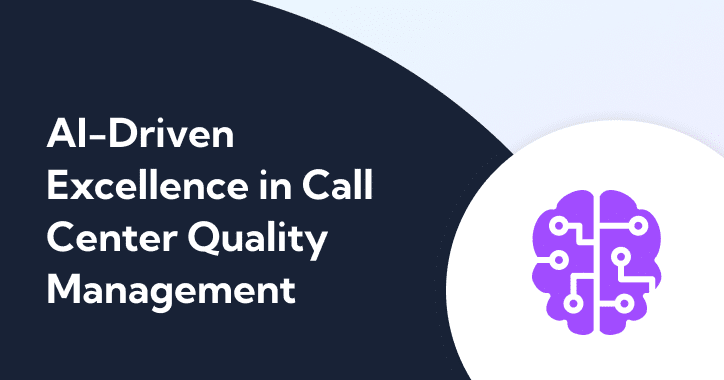In this day and age, customers expect an exceptional customer service experience level. It’s so important for them that they may switch from one brand to the other because of a single negative customer support encounter. But hey, no pressure!
Luckily, there are lots of things you can do to keep your existing customers happier and make new customers. And while upgrading your call center’s hardware can definitely be a good idea, investing in an enabling call center training program for your agents is what needs to be at the top of your priority list.
Your agents are your most valuable assets, and investing in them will help you drive better results for your call center, increase customer and agent satisfaction, and maintain positive word of mouth.
In this guide, we’ll share some of the most vital call center training tips, methodologies, and trends. So grab a cup of coffee and let’s get started!
Why Developing a Call Center Training Plan Is Important
According to Zippia, employees that go through a structured, well-thought-out training program are 69% more likely to continue working at the company for a minimum of three years, resulting in a lower turnover rate.
Retaining your top talents will keep your contact center performing at its best, enabling you to boost your customer satisfaction score and other relevant KPIs.

Types of Call Center Training
When designing a contact center training program, incorporating a variety of training techniques will be more effective and meet the needs of all types of learners.
1. Classroom Training
Classroom training can be a great way for your agents to grasp the core concepts and learn the basics of call center etiquette and best practices. It works best when combined with practical and live call training.
However, make sure that you avoid turning your classroom sessions into boring college lectures. Aim to keep your agents engaged with practical workshops and group discussions.
2. Live Call Training
Live call training is one of the best methods to train your call center staff. Think about it; if you let your call center agents listen to live customer calls, they’ll be able to put theory into practice, allowing them to apply what they’ve learned in classroom training. Live call training is essential for both experienced employees and new hires. It’s particularly important during the onboarding process to help new agents gain confidence in their skills and learn from their mistakes.
3. Online Training
Online training is particularly suitable for distributed teams in remote or hybrid work environments. It compensates for the lack of face-to-face coaching and mentoring.
But that’s not the only situation where online learning can be beneficial. You can combine online learning with other forms of mentoring to help your customer service representatives get the most out of your training program.
4. One-on-One Training
One-on-one training can be resource-intensive, but its value is unmatched. One-on-one training helps managers identify their agents’ strongest and weakest points. Plus, call centers that incorporate one-on-one training have the lowest turnover rates.
5. Mentoring
While in-house mentoring programs are rare in the call center industry, many call centers are incorporating external mentoring programs to support their agents and help them take their careers to the next level.
Mentoring and coaching are effective only if the relationship between the mentor and the student is good.
How Do You Train Call Center Agents?
Here are some tips that will help you train your agents more effectively:
Educate Agents on Their Desired Outcome
The desired outcome might seem obvious to you – wanting to provide your customers with exceptional support or sales experience. But for new hires, especially those with little to no work experience in contact centers, it’s not as straightforward.
Agents may think that their job is to handle the customer’s problem, regardless of how long it takes or how many reroutes it requires.
For those reasons, you must make it clear to your call center agents that their goal is to resolve the customer’s problem upon first contact. Customers don’t want to waste their time; they need solutions as quickly and effortlessly as possible.
When designing your agent training program, make sure that these goals are highlighted and reinforced throughout the program with call center training courses, seminars, and self-paced materials. It’s also a good idea to keep your agents informed with vital call center metrics and KPIs. This will help them evaluate their performance and discover new ways to improve.

Hold Regular Training Sessions for All Agents
A typical contact center agent training program often goes as follows: new hires attend a few training sessions over the course of a few days. If this is the approach you take, how has it worked for you? Do your agents perform as expected? Can they recall what they’ve learned a few weeks after the training program is over?
We’re going to take a hard guess here: your training programs don’t deliver the outcomes you’re hoping for. And no, the problem isn’t in the training materials, the trainers, or your agents; it’s the one-size-fits-all, one-time training approach that needs to be changed.
The contact center industry is always changing, with shifting customer preferences and expectations, updated best practices, and new tools and technologies regularly emerging. The most successful contact centers make continuous learning a part of their culture. Without continuous training, your agents won’t be able to keep pace and stay at the top of their game.
You should also give your agents the opportunity to learn new things on a self-paced basis. Combining live training with pre-prepared materials, explainer videos, practical guides, and other resources is an excellent approach that’ll keep your agents in the loop all the time.
Additionally, keep in mind that not all your agents will gain traction at the same time, so you need to invest in individual training sessions that fill the knowledge gaps of each agent.
Hold Small Group Training Sessions Discussions
The good old group training is still a highly effective method to familiarize your agents with your call center procedures and teach them how to handle the customers’ pain points in the best and most-empathetic way.
You can hold your group training sessions in a workshop format. Here’s how you can arrange them:
- Divide your agents into groups
- Provide each group with a problem or case study to find a solution to and discuss it
- Set a timer and ask your agents to provide their solutions before time is out
- Let each group explain the task they had in hand to the other groups and how they reached their conclusion
One of the most significant advantages of this method is that each group receives feedback from the rest of the group, which encourages a culture of critical thinking and constructive criticism in your call center. Not to mention, you’ll improve your agents’ soft skills.
Use Video Conferencing for Training
Since hybrid and remote work environments have become the new norm in recent years, that doesn’t exclude the importance of training your agents.
If you don’t want to gather your contact center employees for on-site training, or you’re managing a multicultural team from different parts of the globe, video conferencing would be your best bet.
Online meeting tools, such as Microsoft Teams and Zoom, have made it easier for contact center leaders to communicate with their remote-working agents. These tools can be utilized to tailor online courses and training programs that make the most out of the new workplace.
Another advantage of video conferencing is that you can bring in experts from other office locations or teams to expose your agents to different perspectives and ideas.
Bring Top-Performing Agents to Training
Training by example is potent, period. Instead of hiring an external or in-house mentor for training purposes, you could ask your current top-performing agents to take care of it. Having your rockstar agents teach your new hires how to respond to customer queries and provide stellar customer service will help them excel in their jobs.
You can also assign one or two new hires for each of your experienced agents to continuously support them whenever they don’t know what to do in a call.
Show Agents How To Find Answers to Their Questions
Your customers aren’t the only ones that need a self-service knowledge base; integrating an internal knowledge base is also important. Experienced employees can use the knowledge base for a refresher or stay updated whenever something new pops up, and new employees will find it useful in certain situations where they don’t know how to handle customers.
You can use knowledge-based software and hire content creators to prepare the content. Ideally, your knowledge base should contain a combination of FAQs, how-to articles, video tutorials, and SOPs (Standard Operating Procedures).
On a side note, keep in mind that an extensive knowledge base can be too overwhelming for new hires, so it’s important to familiarize them with it before they start using it. You also need to encourage your agents to use the knowledge base before reaching out for help from their seasoned peers or managers. This way, your agents will find solutions to their questions and problems faster, helping you maximize your call center productivity.
For technical issues, teach your agents how to get support from the tech team.
Shadowing Top Agents in Your Contact Center
While some may think that shadowing is an old-fashioned, resource-intensive training technique, it’s still one of the fastest and most effective ways for new agents to learn a new skill or role.
There are two approaches you can take here. One way is to let your new hires observe how top-performing employees handle customer calls and use advanced tools like conversation Intelligence software to respond to customer queries in a more professional way.
Another method is to make new agents listen to past call records handled by their more experienced peers. You don’t necessarily have to only make them listen to calls that exemplify excellent customer support experience. In fact, one of the best ways to make this work is to make your agents listen to multiple calls and ask them to point out the positives and negatives from their own perspectives.
Use Incentives and Gamification
Everyone loves rewards! So why not motivate your agents with incentives like performance target bonuses and anniversary gifts?
Your agents will not only feel appreciated but also be encouraged to go above and beyond in their job. This can also boost employee engagement and reduce absenteeism.
Another good idea is to gamify your agents’ jobs. For example, you could offer a small daily prize for the agent with the highest first-contact resolution rate.
The ROI of Call Center Training

According to recent research by Salesforce, 94% of customers say that a positive customer service experience is one of the top reasons that encourage them to purchase again. Another survey of 1,400+ company representatives found that up to 88% of customers have higher expectations than ever when it comes to the level of support they get.
Keeping your customers satisfied and meeting their expectations is essential for your business, and that can only be achieved with exceptional agents that know what they’re doing. Investing in your agents’ training will drive better results, maximize your ROI, and make your customers happier and willing to come back.
Make Sure Your Training Is Practical and Hands-On
Unleashing the full potential of your agents is vital for your call center’s success, and there’s no way around it other than creating a robust training program that creates a culture of continuous learning and maximizes agent performance.
With Balto, you’ll be able to provide your agents with the confidence they need to handle even the most challenging customer queries from day one. Using Balto is like providing a dedicated trainer or assistant for each of your agents. It’s the one-on-one training of the future!
Find out how Balto can enhance your call center training with a free demo.






